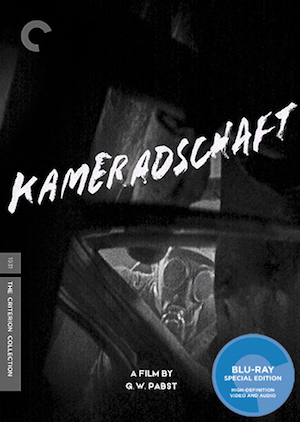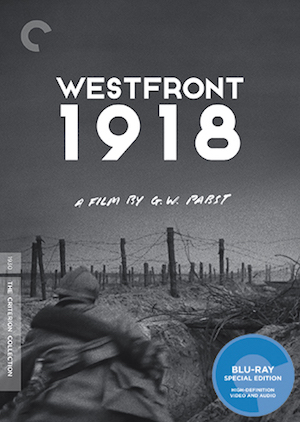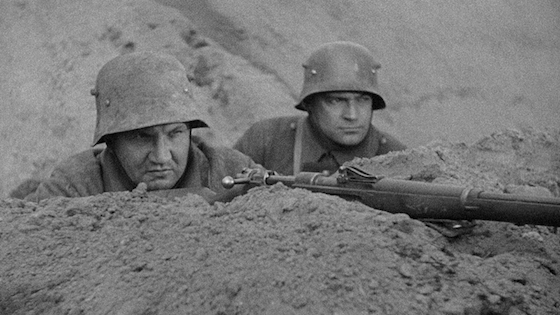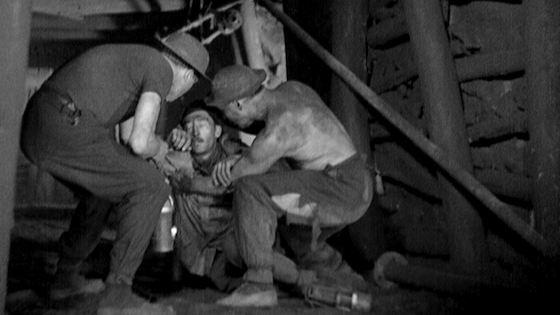Two concurrent Blu-ray/DVD releases by the Austrian director G.W. Pabst from The Criterion Collection help make the case that Pabst should always be a name that comes up when talking about the pioneers of cinema. Technically, you could say that he’s already viewed as a giant of silent film from the back-to-back 1929 successes Pandora’s Box and Diary of a Lost Girl, but those controversial films (both starring young American actress Louise Brooks) fall under the category of sexually-charged melodramas.
These two brand-new 2K digital restorations are about as far away from that as you can get, and they prove that Pabst’s true calling was socially charged drama with a serious anti-war bent. Both Westfront 1918, released in 1930, and 1931’s Kameradschaft (Comradeship) are bleak but stirring ensemble pictures with an unusual amount of naturalism for the time. And in their own way, each is a cry for unity and understanding.
Westfront 1918 follows four infantrymen on the Western Front as they suffer the everyday hardships and insanity of trench warfare. This was Pabst’s first sound film, and while most directors in Hollywood were struggling with how to achieve camera movement while their microphones were stationary, Pabst had a mobile sound unit. This means his camera was free to move along the surface of the trenches, giving us the full wide expanse of what the soldiers were experiencing.
Rather than force common war story beats onto the characters, Pabst employs a more observational tone. At times, this can lead to a frustrating lack of forward movement, such as when the men visit a music hall on leave and we are treated to what a full performance by dancers, a clown, and a marching band. But there’s something to be said for not telegraphing exactly where each of the soldier’s stories are headed. While that may be the case, none of them will be any better off.
It’s only at the very end of the movie that the specter of death finally takes its toll, revealing true madness in the form of the lieutenant (Claus Clausen), whose howls of despair are an unforgettable close to a movie that will no doubt haunt me for years.
Among the supplements on the Westfront 1918 Blu-ray is an hour-long French television interview featuring World War I veterans reacting to the film in 1969. It’s remarkable how, almost 40 years later, this film touched these men and rang true with their own experiences. Any horror-of-war movie set during WWI that would be made today would doubtlessly be viewed through a modern lens, due to the advances in technology and the differences in filmmaking language compared to 1930. So its fascinating not just to see Westfront 1918 in the context of its own time, just 13 years after it is set, as well as the way that it resonated with veterans of that actual war.
 1931’s Kameradschaft is the perfect follow-up to Westfront 1918, and should be viewed as a companion piece. It’s also the better of the two films, in terms of both storytelling and technical mastery.
1931’s Kameradschaft is the perfect follow-up to Westfront 1918, and should be viewed as a companion piece. It’s also the better of the two films, in terms of both storytelling and technical mastery.
Based on real 1906 mining disaster, Pabst moved the story to 1931 so he could access the post-WW1 feelings more fully. The nightmarish battle of Verdun is even pictured in both films, but in Kameradschaft, its a genuinely terrifying flashback scene, and a clever visual linkage is provided through the use of the same gas masks used by those trapped in the mine and their unlikely rescuers.
The mine is so big that its located on and crosses the French/German border, separated by a literal gate. When a fire breaks out on the French side, an explosion causes collapses and traps many of the workers inside. The last people one might expect to help rescue the French mine workers are their German counterparts — the first ones who spring into action, albeit with some protest from some.
“Cowards need not come along,” says one German mine worker, after rounding up other Germans to help. The heroism of these men who were deadly foes just a year before is one of the more obvious ways Pabst gets his humanist point across. Where Westfront 1918 was almost wholly dark and pessimistic, however, Kameradschaft offers hope, ending with pretty direct pleas for understanding, and no more war.
The mix of elaborate studio sets and location shooting in the mines is unique. On one hand, they give the movie a naturalistic flavor but there’s also lots of camera movement and beautifully framed shots that mark it as more expressionistic. The lack of a score also marks it as less manipulative than traditional Hollywood pictures of the day.
The acting styles are also operating at both ends of the spectrum. At least some of the performers were probably non-actors, and while other actors may have been told to be less big and broad and more natural, there’s also a good amount of stagey, melodramatic acting as well. The mixing of these usually diametrically opposed styles in all respects somehow work to make Kameradschaft a stronger film.
Included on this disc is a brand new and very informative 30-minute piece featuring Film scholar Hermann Barth talking about all facets of the film and its legacy. Film scholar Jan-Christopher Horak has a shorter piece, filmed in 2016 along with his Westfront 1918 interview, and both discs feature short audio-only interviews from 1988 with editor Jean Oser.
Each of these wonderful Criterion G.W. Pabst re-issues are worth checking out, preferably viewed as a double feature. Now that they are restored to as close to their original vision as can be, they serve as a timely reminder of war 100 years ago and are a devastating window into a world that seems a lot farther way than it really is. Somethings never change. We still have a lot to learn.












Comments on this entry are closed.